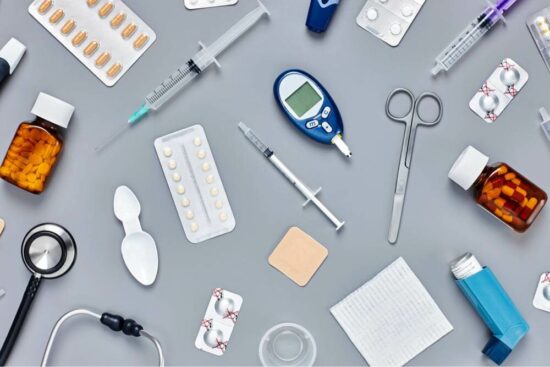Drug-Device Combination Products
The impact of Article 117 of the EU Medical Device Regulations 2017/745
Published 17th April 2023

The Medical Devices Regulation (EU) 2017/745 (MDR) was introduced in 2017 and became applicable in the European Union on 26 May 2021, replacing the Medical Devices Directive 93/42/EEC (MDD). Article 117 of the EU MDR requires that the device component of a drug-device combination undergoes formal assessment by a Notified Body to ensure that it meets the applicable requirements of the EU MDR. The results of the assessment of the conformity of the device part shall be included in the marketing authorisation dossier.
Article 117 affects integral products, referenced and co-packaged device components where the medicinal substance achieves the principal mode of action such as those devices intended to administer a medicinal product.
Single integral products comprise a device component with a medicinal product, intended to be used exclusively in the given combination and are not re-usable (multi-dose products which cannot be re-filled fall within this criteria).
Co-packaged products comprise a medicinal product where the medical device is packed together with the medicinal product.
Referenced products include a medicinal product where the product information refers to a specific medical device to be used with the medicinal product and where the medical device is obtained separately.
Single integral, co-packaged and reference products include device components which typically have measuring, metering or delivery functions.
How does a manufacturer of a drug-device combination ensure compliance with the EU Medical Devices Regulation (MDR)?
The device component of a single integral product shall meet the General Safety and Performance Requirements (GSPRs) as per Annex I of the Medical Devices Regulation (MDR). Usually, this will require application to a Notified Body for a Notified Body Opinion. The assessment will include suitability of the device component for its intended purpose and should consider the relevant quality aspects of the device in relation to its use with the medicinal products. In some cases, the device component may be CE marked.
Co-packaged and referenced devices will require a CE mark to demonstrate compliance with the Medical Devices Regulation (MDR) in its entirety. Depending on the device classification, the conformity assessment route will vary, with Class I, non-sterile, non-measuring and non-reusable surgical instruments requiring self-certification. All other device classes, Class I sterile, measuring, and reusable surgical instruments, Class IIa, IIb and III, will require Notified Body involvement.
Once a CE certificate, Declaration of Conformity or Notified Body Opinion (option is dependent on the device classification and intended use) has been issued for a device component of a drug-device combination, the evidence of conformity is to be included in the Marketing Authorisation Application of the medicinal product.
What is the timeline for Medical Devices Directive (MDD) compliant device components of drug device products to transition to the Medical Devices Regulation (MDR)?
Prior to the application of the EU Medical Devices Regulation (MDR), the device constituent of a single integral product, while required to comply with the Essential Requirements of the MDD, did not undergo formal assessment by a Notified Body. Any new single integral products will require a Notified Body Opinion or CE mark to demonstrate conformity of the device component to the Medical Devices Regulation (MDR) as of 26 May 2021. It is important to note that the Article 117 requirement does not retrospectively affect medicines licensed before 26 May 2021, however significant changes to device components in existing licensed products may now need to be evaluated in accordance with the requirement of Article 117.
Co-packaged and referenced devices, were typically CE marked as standalone devices under the MDD. Co-packaged and referenced devices that are already CE marked under the MDD will need to transition to comply with the requirements of the Medical Devices Regulation (MDR). Devices that were CE marked in accordance with the Medical Devices Regulation (MDR) prior to 26 May 2021 can still be placed onto the market until certificate expiry, up until 26 May 2024. Upon expiration of the certificate, the devices will need to be assessed for conformity to the MDR and if successful, will have a Medical Devices Regulation (MDR) CE Certificate issued.
In March 2023, Regulation (EU) 2023/607 of 15 March 2023 was published in the Official Journal of the European Union to extend the transition period of legacy medical devices and to remove the sell-off period for medical devices. In practice, this means that any medical devices with certificates issued prior to 26 May 2021 and those which are still valid may benefit from the extension up until 31 December 2027 (Class III and IIb, mostly implantable with some exceptions) and 31 December 2028 (all other Class IIb, IIa and Class I sterile and measuring devices). It must be noted that the extension only applies under specific conditions; manufacturers are expected to comply with the Medical Devices Regulation (MDR) requirements related to Vigilance, Post-Market Surveillance and Registration for Economic Operators, devices are required to continue to comply with the MDD, devices should not present significant changes in the design and intended purpose, nor should they present an unacceptable risk to the health and safety of users. Finally, the manufacturer must have a Medical Devices Regulation (MDR) compliant QMS in place before 26 May 2024, as well as having lodged a formal MDR conformity assessment application with a Notified Body before 26 May 2024. A written agreement between the Notified Body and manufacturer to conduct a conformity assessment will also be required before 26 May 2024. The removal of the sell-off period means that devices certified under the MDD that are already in the supply chain can be made available as long as the shelf-life allows.
DLRC’s Medical Technology service is headed by a Principal Consultant with over 12 years experience of the regulation of medical devices working for both a regulator (MHRA) and within industry. For assistance with navigating the Medical Devices Regulation (MDR) contact our experts via the links below, or email us via hello@dlrcgroup.com.